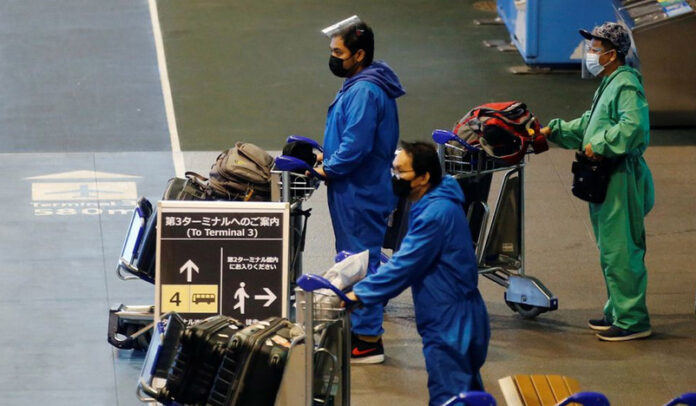Men wearing protective suits make their way at a bus stop at Narita international airport on the first day of closed borders to prevent the spread of the new coronavirus Omicron variant amid the coronavirus disease (COVID-19) pandemic in Narita, east of Tokyo, Japan, November 30, 2021.
Japan on Wednesday said it would expand its travel ban on foreigners entering the nation, preventing those with resident status from 10 African nations including South Africa from entering the country “for the time being.”
On Monday, Japan took some of the strictest steps globally by closing its borders to all newly entering foreigners in light of the emergence of the Omicron variant of the coronavirus. A day later, Japan’s first Omicron case – in a Namibian diplomat – was discovered.
The border closing will be in effect from midnight on Wednesday for at least a month.
The new rules will apply to foreign residents from South Africa, Eswatini, Namibia, Zambia, Malawi, Mozambique, Lesotho, Angola, Botswana and Zimbabwe.
“From the view of prevention, we won’t just restrict new entry by foreigners but also returning foreigners with resident status, unless there are special extenuating circumstances,” chief cabinet secretary Hirokazu Matsuno told a news conference.
“We will maintain a sense of urgency and keep track of the situation in various countries to be able to respond quickly and flexibly.”
Of other passengers on the plane with the Namibian diplomat, he said none of the 70 people designated as close contacts have shown signs of falling ill.
Japanese border measures were loosened slightly a few weeks ago, but all of those changes have been rolled back in a move generally applauded by the public and accepted by business leaders, although some sectors of the economy dependent on foreign trainees could be hit if the closing is extended.
Source: Reuters / Reporting by Sakura Murakami and Elaine Lies; Editing by Christopher Cushing and Lincoln Feast









